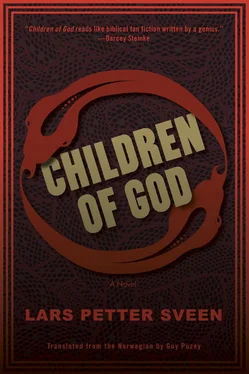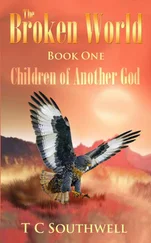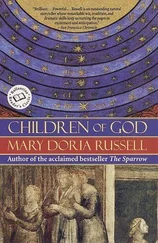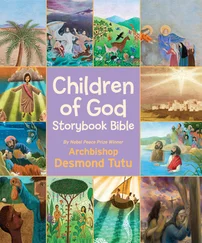Other women told her that Jesus had such hair and a beard as if he were a lion from the banks of the river Jordan. Jesus had limbs so brown and tender that they could taste salt on their lips. Jesus had eyes that were as bright and dark as day and night. And his voice was honey, sweet and thick and golden.
But Anna didn’t want to speak about him in those terms. There was something else about Jesus. Something that linked him to the last kiss from Andrew, to Reuben’s soft singing. It was the strange pattern in which his fingers moved. It was the way he smiled when he was with her, as if she made him shy. It was the way her fingers became so warm when he was near her. It was more, more than that, it was the way he might sit next to her while they ate. The way he asked her questions and listened, waiting while she answered, and then asked more questions. What were their first words by the well, other than hesitant, childlike tentative efforts, like the first time a young bird beats its wings.
“Where have you come from?” Anna asked him, putting down her pitcher.
“Nazareth,” he said. “Galilee.”
“What are you doing here?” she asked.
“We’re traveling about. We stopped here to rest.”
“Were you with the people who just left here?” she asked. “All those women?”
Jesus opened his mouth to say something, but Anna continued, saying that he reminded her of Andrew.
“The way you speak,” she said. “Or, I don’t know, maybe there’s more of a Reuben in you, the way he was on good days.”
Jesus stared at her.
“Who are these men?” he asked.
“Oh, they’re no one,” said Anna.
“One of us is called Andrew,” he said. “Might he be the one you’re talking about?”
Anna shook her head. “No, no,” she said. “My Andrew’s gone. I’d have seen him if he was with you.”
“There are more of us,” said Jesus. “Andrew’s in Nazareth, he’s waiting for us there.”
Anna stood there, completely still.
“What does he look like?” she asked.
“What does he look like?” Jesus replied. “He’s the brother of Simon Peter, one who’s close to me.”
“Is his hair long and black?” Anna asked. “Are his eyes dark? Is his nose long and bent at the bridge? Does he hold the fingers of his right hand up to his mouth when he’s nervous?”
“That sounds like Andrew,” said Jesus, “but I’m not sure. You can ask Simon Peter.”
“I want to come with you,” said Anna.
Anna didn’t know what else to say, or what she could do. Had she found Andrew? She tried to stay calm, brushed her hands on her clothes, touched her ear and heard fluttering: there was something in the air, wings beating. It was the black bird. It flew past, over the well, and Anna thought it must be a sign from Andrew.
“I want to come with you,” she said.
“If you want to, you can come,” said Jesus. “We travel about spreading the Word of God. We move about as free people. Nobody owns us. You can ask Simon Peter about Andrew, as I think he can give you a better answer than I can. We’re heading back to Galilee now. I come from Nazareth. My brothers live there, the ones I grew up with. Andrew is with them. I’d like you to come with us, if there’s nothing here, nothing binding you to stay.”
“But you do realize what I am?” Anna asked.
Jesus looked at her. “Yes,” he said. “You’re like me.” Then other voices could be heard. Anna turned around. It was some of the women she’d seen while she was standing between the trees. They’d come back and were carrying small baskets, talking softly, smiling to each other, but when they saw Anna and Jesus, they stopped and fell silent. Anna stood there, one hand on the pitcher, the other over her chest.
“Who are you?” one of them asked.
“Are you from here?” another asked.
“This is Anna,” said Jesus. “She’s coming with us to Nazareth.”
“I want to meet Andrew,” said Anna.
One of them came over, took Anna’s hand, and held it in her own.
“Hello, Anna,” she said. “My name’s Orpah, and I know Andrew.”
“Can you take me to him?” Anna asked.
Orpah nodded, smiled, and said she would.
Then the other women joined them. One of them raised her hands toward Anna’s head, and Anna flinched.
“I’m not going to hurt you,” the woman said. Anna let her stroke her hand over her forehead, over her cheekbone and her torn ear.
“It’s been damaged,” the woman said. “It’s like sand in a little leather pouch.” One of the other women, who was younger than all the others and who wouldn’t stop smiling, lifted up her hands and touched Anna’s ear.
“It’s like dough,” she said.
“It was crushed,” Anna said, moving their hands away. “It was my second man.” The women were standing around her now, they were so close. Jesus said something, and Anna turned toward him.
“Anna, if you drink this water,” he said, touching the water in Anna’s jug with his hand, “then you’ll thirst again. You’ve chosen to join us, and I’ll tell you that the water we drink turns into something else, it’s alive. Here, take my hand.”
Anna took Jesus’s hand, and his fingers came between hers. They were cool to the touch, they were warm, she held on to him, he pulled her toward him, and a haze fell over them.
It was in the middle of the day, as Anna remembers it, even though she sometimes said, in her latter years, that it happened beneath the morning sun. When she thought back to it, everything was surrounded by his glow. Her hands, her ear sticking out, the way she whispered Andrew’s name, Jesus’s eyes, bright, dark. The sultry but cold smell of the well, the women’s soft humming, a faint murmur between the bushes and trees, from the tiny insects. In the middle of the day, a new day was beginning.
Anna didn’t go back to Sychar. She waited until Simon Peter came, together with the other men. Orpah introduced him to her and explained that Anna was looking for Andrew. Simon Peter seemed surprised and said that his brother hadn’t said anything to him about it.
“But he doesn’t talk to me about things like this,” he said. “I’m his big brother, you know what it’s like. When was it you met him?”
Anna tried to explain when Andrew was with her, for how long, and when he’d left. While she spoke, Simon Peter scraped at the sand with a small stick.
“That might add up,” he said when she’d finished. “There was one spring when Andrew was away from me, which might have been about that time. That was before the Lord found us. I thought I’d never see him again, but then he came back.”
Anna nodded, wanting Simon Peter to tell her more, but he fell silent. He was taller than Andrew, with paler and thinner hair, but they had the same nose. He got up, threw away the stick, and told her that she’d meet him if she came along to Nazareth. Anna thanked him, but he told her she didn’t need to thank him, as he hadn’t done anything.
“You came to the Lord, just as Andrew came back to me,” he said. “Maybe Andrew’s been waiting for you to find him.”
Anna stayed by the well all night, together with the women, the men, and the children. She lay there in the open air, thinking of Andrew and staring at the stars. What if everything that glimmers were connected, what if all you had to do was to move your finger from one twinkling star to another? Would that create a pattern, a plan that could reveal everything? One that would show where to press, where to touch to make it all open up, so that she could be with him and find out why he left.
“It was the same for me too,” a voice said close to her. It was Orpah. “I couldn’t sleep for the first few nights. I thought the people I was escaping would come to get me.”
Читать дальше











